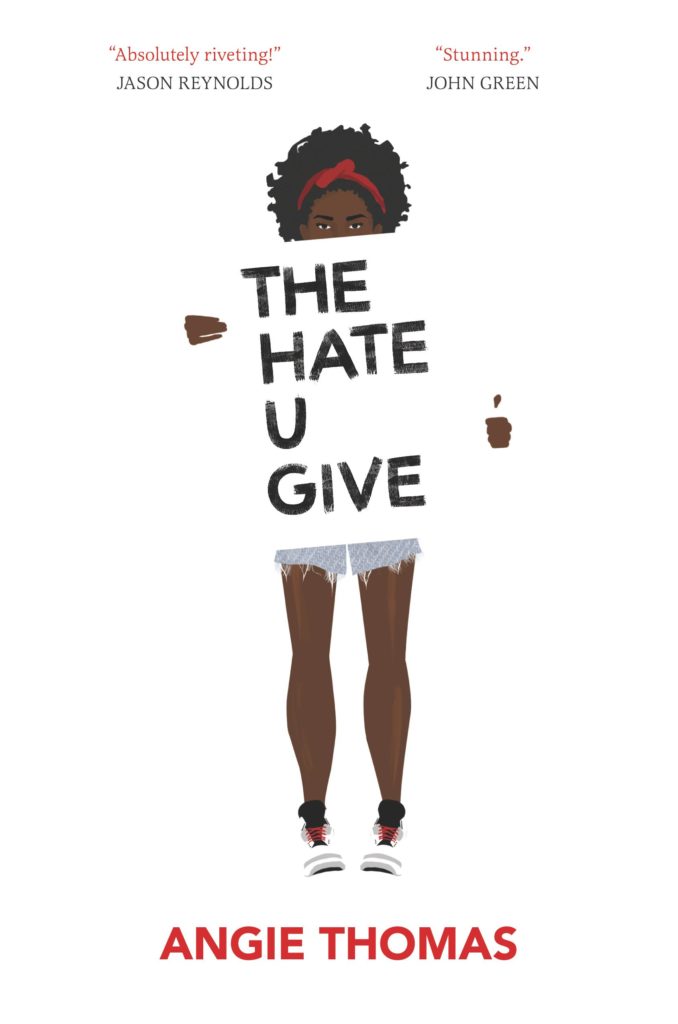 I’m incredibly, incredibly psyched to bring you this interview with Angie Thomas, the author of the (pick your adjective) incredible, game-changing, #1 massively bestselling, movie-in-the-works young adult novel The Hate U Give. If I tried to list all the accolades T.H.U.G. has received you might faint from the task of reading them all.
I’m incredibly, incredibly psyched to bring you this interview with Angie Thomas, the author of the (pick your adjective) incredible, game-changing, #1 massively bestselling, movie-in-the-works young adult novel The Hate U Give. If I tried to list all the accolades T.H.U.G. has received you might faint from the task of reading them all.
Nathan: First things first. The Hate U Give was the subject of a 13-house auction and all kinds of hype, but as the author, I’m guessing nothing felt like a sure thing prior to publication. What was it like waking up on publication day and what was the feeling when you saw it hit the bestseller lists for the first time?
Angie: Publication day was a huge blur for me. There were tons of Tweets – my notifications went haywire—full of love and support. It felt surreal though that people were talking about my book – it almost felt like they were talking about someone else. I had to pinch myself several times. When the book hit #1 on the NYT, I was absolutely floored. It was a dream come true, and I had a “Wow, is this happening?” moment. It once seemed impossible that I’d ever get published, and at that moment all of the rejections felt suddenly worth it.
Despite its reputation for being liberal, there’s long been some pernicious attitudes within the publishing industry, including an attitude in some circles that books featuring characters of color “don’t sell.” For many talented authors in the past, this ended up becoming a maddening self-fulfilling prophecy, as some great books got pigeonholed and didn’t receive a publisher’s marketing muscle, if they even made it to publication at all. Do you think this is finally starting to change with the success of T.H.U.G.? And what still needs to change?
I hope it’s starting to change. For a long time there was this myth in publishing that black kids don’t read, and THUG along with other great books has proven that to be a lie. Black kids will read if you give them something they connect with, and other kids will even read about them. We need to see more books featuring marginalized characters by marginalized authors.
We also need diversity amongst the gatekeepers. This will sound like an odd example, but I look at Formation by Beyoncé. That song is not meant for everyone but everyone can enjoy it. But imagine if Formation was a book and the gatekeepers weren’t the intended audience and kept this work from reaching its audience simply because they didn’t “get” it. It would be a tragedy, right?
That’s how we have to look at publishing. Not every book is written for everyone, but if we have diverse gatekeepers who can “get” those stories, it will ensure that they reach their intended audiences. We need diverse books, we need a diverse industry.
One thing that stood out to me in one of your interviews was that you first started writing your first story as a young person not long after you witnessed a gang shootout. This really resonated with me, as I first started writing in high school after one of my classmates was murdered. What is it about writing as a response to trauma that’s so powerful?
Writing in response to trauma is cathartic for one. It allows the writer to release those emotions. When those emotions are fueled into our writing, our readers have no choice but to share them to some extent as well. That, to me, is how empathy is born. Empathy is more powerful than sympathy, and if we put ourselves into those traumatic situations through books, maybe we’ll walk away changed and maybe we’ll walk away with an urge to change things.
How are you staying productive, given the news these days? (Or are you?)
I’m currently working on my second book while still traveling to promote/discuss THUG, so I’ve been very busy haha. I try not to let the news affect me. Of course, it’s overwhelming at times and there are moments where I have to step away from it all, but I let my anger and frustration pour into my writing. I understand that it doesn’t work like this for everyone, so I encourage writers to do whatever is best for their self care. If that’s writing, great. If it’s not, that’s great too. Do you.
I want to switch gears a bit and talk about craft. You sometimes hear advice out there that authors shouldn’t try to use modern slang or cultural references and instead should go for more of a “classic” sound. First off, I’m so glad you didn’t listen to them, but how did you go about making sure your slang and references sounded correct to a high school ear? How did you find Starr’s voice?
When I wrote THUG, I didn’t go into it thinking that I wanted to write a classic. Honestly, I’m not a fan of the classics, and that’s because when they were forced own my throat, I was a teen and I could not connect with them whatsoever. I wanted to write a book that connected with those kids who were like me. I wanted it to sound like them now so that they can connect with it now. In a lot of ways, I haven’t grown up (heh) so the slang, musical references, etc are all things that I use myself. But I also listened to the teens in my life a lot and observed how they interact with each other and the world. Trust me, teens can easily tell when you’re trying too hard, and I wanted THUG to feel natural for them.
You have some of the most expertly constructed chapters I’ve read — everything builds so carefully and seemingly effortlessly over the course of the chapter, whether it’s tension or conflict or joy or sorrow. Your scenes then end on an up or down note, which builds still greater tension and deepens over the course of the novel. How conscious were you of your scene construction? Was this all instinct or did you have a framework you used?
It must’ve been instinct because as I read your question, I’m like, “Wow, I did that?” Haha! I’m a huge movie buff and I study cinema a lot, so I look at my chapters as being scenes in a movie. No scene in a film is wasted. Each one takes us on an emotional journey or get us to a specific point in the plot, and that’s something I want to do with my books. I try to look at them as really long movies.
What advice would you give an author who is struggling or just starting out?
- Don’t overwhelm yourself with “writer’s advice.” There are lots of tips out there, lots of so-called “guidelines” but at the end of the day, do what works for you.
- Write for yourself. Don’t write for trends, awards, accolades, film adaptations, any of that. Write the book that you’d like to see on a bookstore shelf that you haven’t seen yet.
Anything else you’d like to say? The floor is yours!
Always remember – no matter how many rejections you get, it only takes ONE yes.

Thanks again to Angie for this interview and what are you waiting for, go buy The Hate U Give for yourself and everyone else you know!



I absolutely LOVE,LOVE,LOVE The Hate U Give! It was especially relatable to me as the kid from the hood who had classes where me and two other students would be the only chocolate chips in the cookie.
Thank you for this great interview and the encouraging advice to keep striving beyond the rejections.
Pigeonholing indeed! It seems some professionals have yet to learn that people are not pigeons. And the Beyonce’ example is not that odd. Imagine whitewashing music or sports (which happened in the past). After electing a black president I expected less whitewashing but some people are slow to learn and quick to regress.
Catharsis, learning from movies, being careful of writing advice, amen! Thanks to Angie Thomas and Nathan for these wise words.
I’m glad you got to interview Angie. I read THE HATE U GIVE recently. What an excellent novel.
As a reader, I don’t have a problem with cultural references and modern slang because I consider that part of the setting. I too have heard the advice about not using these things in writing with the reasoning that it would make the writing seem outdated when it’s consumed at a later time. But for me, good writing is good writing, even if the story is dated in the past. So I would categorize such writing “rules” as what Angie might refer to as “writer’s advice” we don’t need to overwhelm ourselves with.
Really great article!Like it very much!